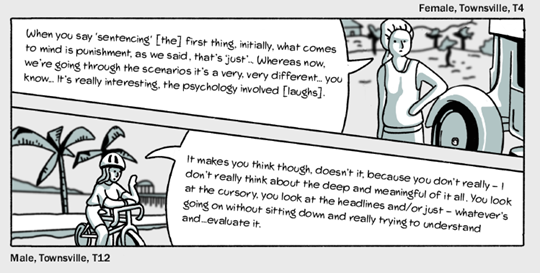Publication
How well do you really understand sentencing?
Our new research paper: Understanding of Sentencing: Community knowledge of sentencing terms and outcomes, delves into what you, the Queensland public, know and think about sentencing. It also reveals some common misconceptions and knowledge gaps.
Key findings
- Of the 66 Queenslanders who joined in one of our focus group sessions, most people tended to overestimate their sentencing knowledge when it came to defining topics like life sentence, probation and parole, and struggled when asked to articulate the correct meaning.

- Many people misunderstand life sentence to mean 'in prison for a lifetime' and most couldn't explain the difference between parole and probation (learn more about parole and probation).

- To test sentencing outcome knowledge, we asked people to estimate imprisonment rates for burglary, murder and trafficking in dangerous drugs. Participants generally under-estimated the proportion of offenders who get sentenced to at least one day in prison (the correct figures are 40-49% for burglary, 100% for murder and 70-79% for trafficking in dangerous drugs).
- Some people thought this was because the media sensationalises crime, others thought it was because courts preferred non-prison sentences.

- When quizzed on length of prison sentence for these 3 offences, most people tend to underestimate how much time is spent in prison for burglary and murder yet overestimate prison time for trafficking in dangerous drugs.

- These discussions also uncovered a general confusion between murder and manslaughter (learn about the difference between murder and manslaughter ) and an incorrect assumption that drug traffickers are typically a ‘king pin’.

- Participant’s understanding generally changed throughout the focus group session as they learned more and discussed different scenarios.

Looking for more research?
Visit our publications portal to see our previous research briefs.
